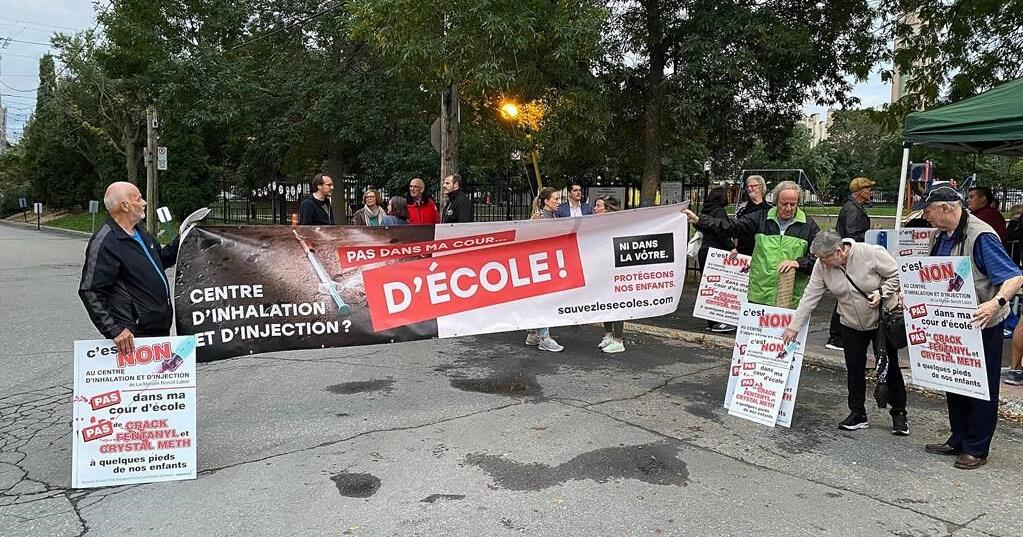MONTREAL – Officials in Montreal are struggling to get the public on board with the city’s approach to treating people with severe addiction and homelessness, as those social crises become fodder for political attacks.
In Montreal’s St-Henri neighbourhood, a supervised consumption site that also provides transitional housing for homeless people with addiction or mental health issues has nearby residents fuming because it’s located near an elementary school. A few kilometres away, in downtown Montreal, another supervised drug use site has helped turn part of the district into what has become known as “crack alley.”
The city is feeling the heat from residents, and in response will hold public consultations on how to integrate services for vulnerable people within urban areas. Montreal’s mayor is also getting criticized by federal Conservative Leader Pierre Poilievre, who held a news conference outside St-Henri’s Maison Benoît Labre on July 12, saying the mayor is forcing children to go to school near a “drug den.”
But there are no easy solutions, according to experts, who say people with severe drug addiction need services like supervised consumption sites — where they can be treated if they overdose — or else they risk dying on the streets.
Elaine Hyshka, Canadian Research Chair in health systems innovation and associate professor at the University of Alberta, says city officials open safe-injection sites in urban areas because that’s where drug users are. These sites, she said, can’t be located in isolated parts of the city because “the vast majority of people will not go more than one kilometre to access the supervised consumption service.”
François Gagnon, senior scientist and special policy adviser at the Canadian Centre on Substance Abuse and Addiction, says that, ideally, safe-consumption sites wouldn’t be located near a school — but that isn’t always possible in densely populated Montreal.
“In a city as dense as Montreal it’s pretty difficult to find something that’s not close to a kindergarten or to a school,” he said.
But these facts don’t console André Lambert, who has lived in St. Henri for the past 15 years, a block away from Maison Benoît Labre. He says that since the facility opened in April, his neighbourhood feels less safe.
“People are scared to live around here,” Lambert said, adding that his neighbour was assaulted the previous weekend by people smoking crack on his doorstep.
Lambert wants to see the centre shut down; he is part of a group of residents who have penned multiple letters to a host of Quebec officialsasking for them to intervene.
Waiting for the bus by Maison Benoît Labre, Marie-Ève Pelletier, who works at a nearby dental clinic, says she often gets yelled at on her way to the bus stop. “It’s always a problem when I take the bus here because I never know how the people will react because they are often aggressive.”
Hyshka says people may linger outside safe-injection sites because there isn’t enough housing. Some of the sites, she said, have become “lightning rods” because they tend to be few and far between, serving large groups of people instead of being spread out across the city over a broader range of facilities.
What is not helping bridge the divide between the public and vulnerable populations, Hyshka says, is that some politicians at all levels of government are “using supervised consumption services as a wedge issue to increase their popular support without thinking about the potential negative costs of their actions.”
Dr. Julie Bruneau, Canada Research Chair in addiction medicine and clinical researcher at Université de Montréal, says homelessness, drug addiction and mental health issues have become much more severe and visible across Canada’s major cities since the COVID-19 pandemic. Supervised consumption sites like CACTUS Montréal, in so-called “crack alley” — a term used by several local media organizations in the city — are struggling because of understaffing, low-pay, precarious program funding and a lack of space to accommodate the large numbers of people who need life-saving services.
The result, Bruneau says, is that in some areas people are upset to see their neighbourhoods becoming the face of social crises, especially if they have paid high prices to buy property nearby. But she says services must be provided where vulnerable people are located.
Gagnon says several measures can be implemented to help prevent backlash from residents who live near supervised consumption sites. They include asking users not to leave the premises while they are highly intoxicated, organizing regular cleanups of discarded needles, and co-ordinating with police or hiring private security to maintain order around sites.
This report by The Canadian Press was first published July 20, 2024.
